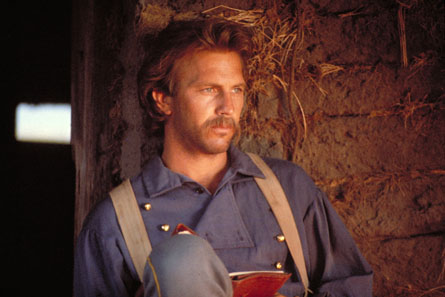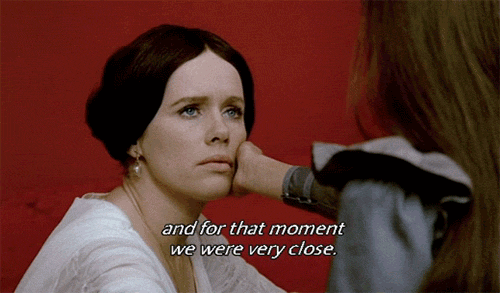Dances With Wolves (1990)
Even though I went to the movies about every other week from 1989 to 1996 or so, I missed quite a few of the films from that era that were most celebrated at the time or have become so in the years since. I have never seen The Silence of the Lambs, or Pulp Fiction, or Braveheart, or even things like Kalifornia or Natural Born Killers that are often referenced in overviews of the zeitgeist of that period. Of course I never saw Dances With Wolves either, even though it won the Oscar for best picture and was otherwise a big hit at the time. Doubtless the western premise didn't interest me very much in those days. Also I had the impression that most of the highbrow, and wannabe-highbrow, eastern critics and opinion makers were dismissive of it, it was three hours long and had substantial dialogue in the Lakota language, the thought of which, unlike French or Swedish, did not inspire any very titillating feelings in me. So it did not seem that I was missing out on any particularly meaningful experience.
However, when the esoteric mechanisms that produce my movie list recently turned this up then, I was bemused rather than dismayed or fired with excitement. My expectations remained modest, but it was new for me, it was, or had once been, famous, it was an Oscar winner from a time of my life and in the life of the nation that I look back on now with perhaps more misty-eyed fondness than I was capable of feeling at the time; all of this aroused my curiosity to see what the appeal had been. And I will admit that while I was watching it I thought it was pretty good. It is the kind of movie that, even more than usual, ought to be seen on the big screen in the collective escapist sanctuary of the public movie house in one uninterrupted sitting. The story must have been reasonably engaging, though I am always more skeptical of the evil/rapacious/dead-souled European versus noble/wise/beauty-loving Indian dichotomy than I am supposed to be. The lives and language and speech and arts and sciences of the Indians strike me as excruciatngly limited and boring and incompatible with the rhythms (or anti-rhythms, if you will,) of my Euro-American soul, and nothing seems to be able to convey the grandeur that exists in them to me. However, the film does bring out the grandeur of the landscape of the American plains, and even (perhaps unwittingly) of the historical events that took place there in the era in which this film was set, and the music is unusually good; these things carry you along even when your intellect is uneasy and feeling some compulsion to protest.
Cries and Whispers (1972)
I had avoided this up until now also. Though I am a fairly big fan of Ingmar Bergman's movies, this one always represented some idea of Peak Ingmar Bergman to me--the high water mark of his mainstream prestige, and of the prestige of the European art film generally, the full realization of his technical mastery of his art, the point at which his maturity, vigor, penetration, and knowledge of life and women came together at their highest levels, such that, as Roger Ebert famously noted in his review, the film represented a depiction of life the reality of which was difficult to watch--the prospect of all which seemed too for a long time too overwhelming to me, especially as it seemed unlikely I would be capable of deriving understanding, and certainly no one could derive any enjoyment, from it. But the tyranny of the list in a sense freed me from this grim fear, and of having to gird myself up to want to see it. It was on my list, it will come, I will watch it, I will expect to understand and appreciate nothing of it, at best maybe it will make some impression on me that will translate positively to the way I carry myself in the world, I send it back, I will write some nonsense on my blog, and then I will be done with it and I can look forward to the time when my list is back in the 30s and 40s again.
So the movie comes, I watch it through. (***Spoiler alert?***) There is a woman dying an excruciatingly painful death. There is a man who attempts to kill himself because his wife is unfaithful to him. There is another woman who sticks a shard of glass into her vagina until she draws blood. This same woman tells her sister that she has always hated her. There is another woman, a servant, who lost her only daughter to tuberculosis and who is treated as, well, a servant, and not an adult with any claim to having a serious life, by most of the characters in the movie. I don't remember if I am missing anything in this vein, but the movie ends, I am not sure that I have been able to hold the main threads of it together in my mind, or even identify what they were, but it did work a kind of mesmerizing fascination on me that I find to be rare, and I did determine that if this movie were stripped of all the baggage of the Ingmar Bergman legend, and I were encountering it as something that had come out of Sweden in 1972 by some obscure director--and there are certainly many great foreign directors who for whatever reason never achieved the fame in this country that Bergman did--that I would have unreservedly thought it was--and I hate using this word unless I can't think of another one that fits--a kind of masterpiece. This realization also freed me in a sense to take some enjoyment in the movie, for the idea of something's being a masterpiece invites the sensation of enjoyment in the form and technical qualities alone even if the themes examined are of the darkest and most unpleasant nature. I was not immediately certain that I wanted to watch it a second time, but I held on to it for a couple of days before deciding to send it back, at which I did decide to see it again, and this second viewing reconfirmed for me that the movie possesses numerous unique and suggestive qualities even in comparison to other great films.
So what are these unique and suggestive qualities? The main one is that every lurking menace that rears its head through the course of the film is carried through, with great patience, meticulousness, and formality, to some conclusion, in many cases its logical conclusion, though for the most part the viewer, at least if he be me, has not bothered to carry out these implications to their logical conclusions beforehand. This gives the whole work an air of fullness in all its parts that most movies fail to achieve, and makes a second viewing, and probably even further ones a fruitful exercise. Like most Bergman movies, it is very stagy, but I have come to realize that, being by nature rather a hyper-linear sort of thinker, I actually like staginess and formality and rules and so on. The sensibility that the movie conveys is that death and unhappiness and the general unpleasantness of living are not opposed to some alternative state of happiness that people ought to seek to achieve, but are the constant realities underlying the human condition and inform all art and love and meaningful response to or meditation upon the nature of our existence.
I have always had the idea that I did not like Liv Ullmann, who was the star of many Ingmar Bergman movies, and maybe I don't, but she is very beautiful in this movie, moreso than I remember her, or think I remember her. Maybe in the past I had confused her with someone else. I haven't seen very many of the later, 1970s-era Bergman movies, which are the ones Liv Ullmann is mainly in, being scared off by their reputed seriousness and grown-up themes, which I still do not think of as exactly applying to myself, other than Fanny and Alexander, which is in some ways a return to the somewhat less tormented spirit of the Wild Strawberries era. I also think I just don't like the name Liv. It evokes an idea in me of someone who is willfully unpleasant as a matter of principle. Her character's beauty in Cries and Whispers, in keeping with the character of the film, does not bring happiness or any sense of contentment to herself or to the other people around her, but seemingly the opposite; but one is persuaded that such ends are not important, that feminine beauty has its part and meaning, and it is a very great one, in the spectacle of life and death, but its nature is impermanent, elusive, and its weak hold able to distract for not much more than a handful of moments against the overwhelming force of existence, which is the relentless imminence of death,
Subscribe to:
Post Comments (Atom)







No comments:
Post a Comment